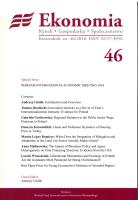Educational mismatches and earnings in Poland: are graduates penalised for being overeducated?
Educational mismatches and earnings in Poland: are graduates penalised for being overeducated?
Author(s): Leszek WincenciakSubject(s): Economy, Socio-Economic Research
Published by: Uniwersytet Warszawski - Wydział Nauk Ekonomicznych
Keywords: educational mismatch;overeducation;undereducation;wage premium;Poland
Summary/Abstract: Qualification mismatch is defined as the difference between the level of qualifications held by employees and those required by the type of work they do. Basing on Kiker et al. (1997), a measure of overeducation and undereducation is proposed on the basis of the ISCO 08 classification of occupations. The dominant education level is determined for a given occupation’s 3-digit group on the basis of the distribution of education levels for employees in that occupation. Each individual having exactly the dominant level of education is considered well-matched. Those with higher levels of education are considered overeducated, those with lower levels − undereducated. An extended Mincer wage regression model with Heckman correction for non-random selection is estimated, using LFS data for Poland for the second quarter of 2013. Significant wage penalties are found in cases of overeducation status, along with positive wage premia for being undereducated, this confirming findings to be noted in the literature of other countries. Applying an approach after Duncan and Hoffman (1981), I find significant positive returns to years of overschooling and negative for underschooling. Young participants on the labour market (graduates) are less penalised for being overeducated, which suggests their overeducation is not necessarily a manifestation of lower ability.
Journal: Ekonomia. Rynek, Gospodarka, Społeczeństwo
- Issue Year: 2016
- Issue No: 46
- Page Range: 145-167
- Page Count: 23
- Language: English

